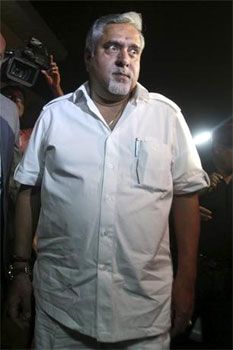 Lenders are increasing pressure on liquor baron Vijay Mallya to facilitate repayment of the debts of his Kingfisher Airlines, which has not flown since 2012 and owes more than $1 billion to a consortium of mostly state-run banks.
Lenders are increasing pressure on liquor baron Vijay Mallya to facilitate repayment of the debts of his Kingfisher Airlines, which has not flown since 2012 and owes more than $1 billion to a consortium of mostly state-run banks.
The airline founded by Mallya failed to make a profit during the eight years from launch to the grounding of its fleet in October 2012 and has been unsuccessful in efforts to find new investors to revive operations.
IDBI Bank is considering declaring Mallya a "wilful defaulter", which in Indian law would mean that he could be forced to stand down from any corporate posts and could damage the fundraising prospects of businesses with which he is associated, the bank's chairman M S Raghavan said.
Fellow state lender United Bank of India, among more than a dozen banks owed money by Kingfisher, has already made such a declaration as the nation's banks seek to address criticism over their failure to crack down on bad debt.
Mallya, once known as the "King of Good Times" for his flamboyant lifestyle, has until Friday to appear before an IDBI committee to explain why he should not be declared a "wilful defaulter", Raghavan told Reuters.
Key roles
"If he is declared a wilful defaulter, then he has to resign from all boards," Raghavan said. "... there will be lot of pressure on him ... The companies with which he is associated as a director cannot borrow from any bank."
Kingfisher owes 7.5 billion rupees ($123.6 million) to IDBI Bank, Raghavan said.
Besides heading Kingfisher Airlines and his UB Group, Mallya is chairman of United Breweries, the Kingfisher beer maker now 38 percent owned by Heineken, and United Spirits, which is majority owned by Diageo.
"It is not possible for a bank to simply declare anybody as a wilful defaulter without following due process," said Prakash Mirpuri, a spokesman for Mallya's UB Group.
"We have robust and comprehensive answers backed by documentation to challenge any such move."
The Reserve Bank of India defines a wilful defaulter as a borrower that is able but unwilling to pay, has diverted loan proceeds for other than their initially stated use or has overstated profits to obtain a loan.
Government policymakers have voiced concern about the problem in recent months and are urging banks to get tough on borrowers as bad loans pile up in an economy experiencing its longest spell of growth below 5 per cent in 25 years.
Additional reporting by Suchitra Mohanty











 © 2025
© 2025